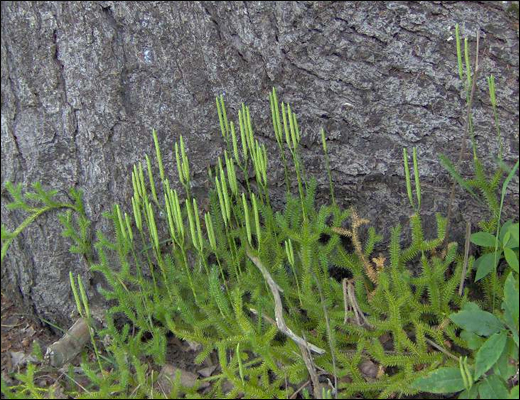Lycopodium clavatum Linn./ Vegetable Sulphur – Ayurvedic Properties, Practical Uses & Parts Used
Abstract
Lycopodium clavatum, commonly known as club moss, is a well-known medicinal plant used in various traditional systems of medicine, including Ayurveda and Homoeopathy. It is primarily valued for its liver-protective, anti-inflammatory and neurological benefits. The plant’s spores have long been used in treating skin disorders and respiratory conditions. It contains bioactive compounds that support memory, digestion and urinary health. Due to its broad therapeutic potential, Lycopodium clavatum continues to be studied for its pharmacological applications.

Introduction
Lycopodium clavatum, commonly known as Club Moss, Clubfoot Moss, Foxtail, Ground Pine, Sulfur, or Wolf’s Claw, is one of the most widely distributed species of the Lycopodiaceae family. As a spore-bearing vascular pteridophyte, it is abundantly found across tropical, subtropical and various European regions. This plant has been traditionally used in diverse medicinal systems for treating conditions such as stomach pain, rheumatic disorders, muscle aches and even neurodegenerative diseases like Alzheimer’s. It thrives in high-altitude areas, grasslands and upland habitats. Despite its continued use in traditional and homoeopathic practices for a range of ailments, Lycopodium clavatum has certain inherent limitations, underscoring the need for a thorough and critical evaluation of its therapeutic potential.
Scientific Classification
- Kingdom: Plantae
- Division: Lycopodiophyta
- Class: Lycopodiopsida
- Order: Lycopodiales
- Family: Lycopodiaceae
- Genus: Lycopodium
- Species: L. clavatum
Vernacular Names
- Hindi: Savan, Chhatrakatri
- Sanskrit: Chhatrabhanjika
- English: Club moss, Stag’s horn moss, Clubfoot Moss, Foxtail, Ground Pine, Sulfur, or Wolf’s Claw
- Tamil: Karai Kaattu Poondu
- Malayalam: Attuvanchi
- Telugu: Vedurapillu
- Kannada: Bekkina Gidda
- Marathi: Bhui Savan
- Bengali: Shaban lata
- Oriya: Saban lata
Habitat
Lycopodium clavatum is distributed across multiple continents, commonly found in Europe, Asia and North America. It typically grows in temperate zones, particularly in moist, shaded woodlands, rocky slopes and mixed forests. However, frequent burning of agricultural and forested areas has led to a decline in its population, rendering the species endangered in several regions.
Morphology
Lycopodium clavatum is a vascular, spore-bearing evergreen plant that can grow up to 1 meter in length. The stems are extensively branched and densely covered with small, spirally arranged leaves. These leaves, measuring 3–5 mm in length and about 1 mm in width, are modified sporophylls that enclose the spore capsules. Yellowish-green in colour, the leaves are also referred to as mesophylls. The stems generate roots at regular intervals, which are thin, adventitious and dichotomously branched. The plant produces homosporous, light-yellow, unicellular spores that are rich in oils and fats. These spores typically take about 3 to 8 years to germinate.
Classical Categorisation
Bhavprakash Nighantu page number 816
Therapeutic Properties
- Aneurysms
- Constipation
- Chronic lung disorders
- Bronchial disorders
- Fevers
- Gastric inflammations
- Chronic kidney disorders
- Anxiety
- Forgetfulness
- Chronic fatigue
- Imperfect erections
- Prostate enlargement
- Kidney stones
- Urinary tract infections
- Digestive ailments
Systemic Actions
- Digestive system – It is very effective in the management of constipation, gastric inflammation and other digestive issues.
- Respiratory disorders – It is useful in case of Bronchial and chronic lung disorders.
- Urinary System – Club moss is useful in case of Kidney stones and urinary tract infections.
Modern Overview
Hepatoprotective Activities
The protective effect of Lycopodium clavatum extract was evaluated against hepatocarcinogenesis induced by p-dimethylaminoazobenzene. In a chronic toxicity study, mice were administered the carcinogen p-dimethylaminoazobenzene (as an initiator) along with phenobarbital (as a promoter) for 90 to 120 days. This exposure led to elevated levels of toxicity biomarkers such as acid and alkaline phosphatase, lipid peroxidation, blood glucose, and cortisol. Additionally, there was a decline in glutathione reductase, succinate dehydrogenase activity, blood cholesterol, haemoglobin and serum levels of estradiol and testosterone. However, treatment with the spore extract of Lycopodium clavatum significantly normalised these biomarker levels in liver and spleen tissues and also resulted in a marked reduction in liver tumour incidence in the treated mice.
Antioxidant Activities
Ferulic acid, a widely distributed phenolic acid in the plant kingdom, is known for its high bioavailability compared to other dietary flavonoids and monophenolics. It has been recognised as a strong antioxidant and anti-inflammatory agent, capable of interrupting free radical chain reactions. Additionally, apigenin, a bioactive flavonoid isolated from Lycopodium clavatum, activates nucleotide excision repair (NER) genes to protect skin keratinocytes from UV-B-induced reactive oxygen species (ROS) and DNA damage. The study suggested that apigenin enhances the repair of UV-B-induced DNA lesions by upregulating NER genes, removing cyclobutane pyrimidine dimers, suppressing ROS formation, and downregulating NF-κB and MAPK pathways. Furthermore, apigenin was shown to induce apoptosis in A375 and A549 cancer cell lines via mitochondrial dysfunction and selective cytotoxic activity.
Practical Uses
- The spores are used topically to treat weeping eczema, diaper rash, and wounds.
- A decoction of the whole plant is used for liver disorders and urinary tract infections.
- Powdered spores can be dusted over moist skin to prevent chafing and infection.
- Taken in low doses, it helps in managing gas, bloating, and weak digestion.
- Traditionally used for relieving pain in sciatica and lumbago when applied as a paste.
Part Used
Whole plant
Conclusion
Lycopodium clavatum is a valuable medicinal plant with extensive therapeutic potential, especially for liver, urinary, digestive, and neurological health. Its spores, in particular, have been prized for centuries for both internal and external use. With its deep roots in Ayurvedic and folk medicine, Lycopodium clavatum continues to play an important role in natural healthcare systems. Continued research into its bioactive compounds may unlock further benefits in modern pharmacology.



